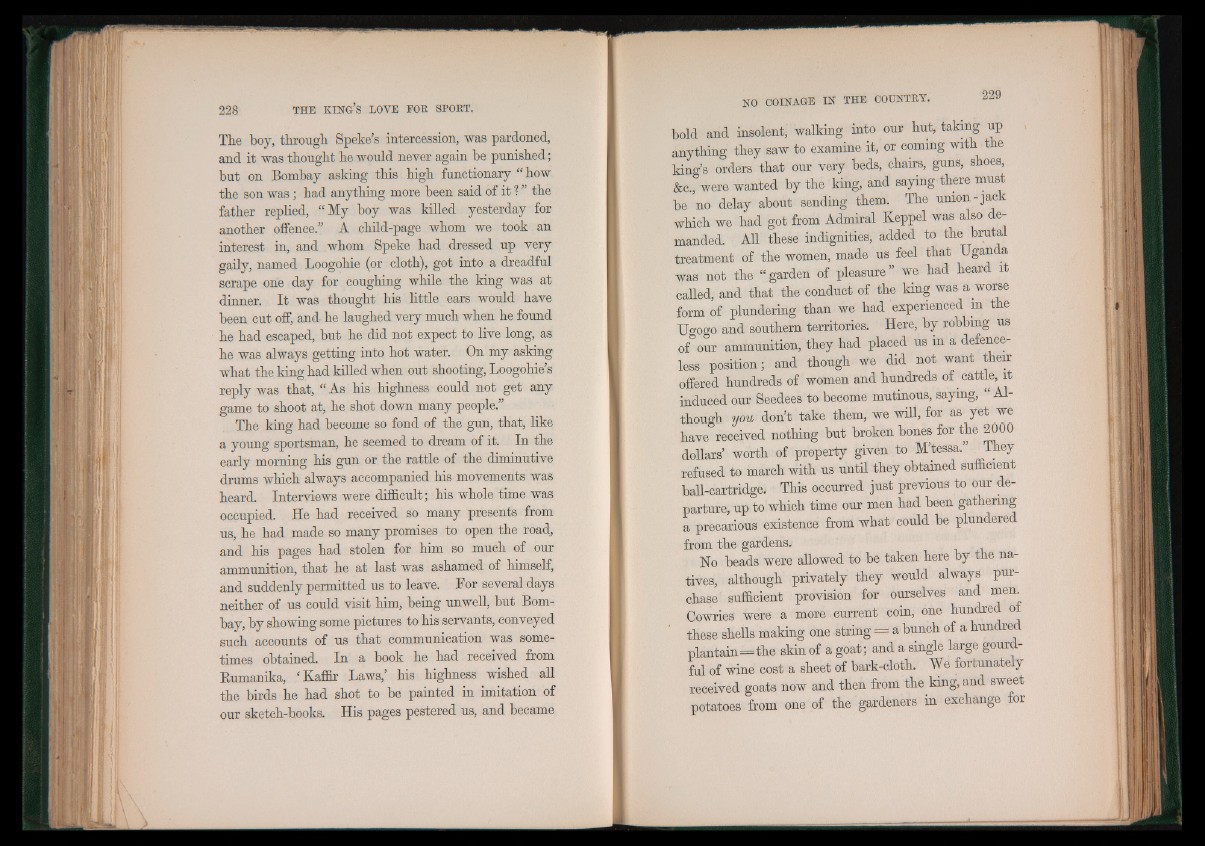
The boy, through Speke’s intercession, was pardoned,
and it was thought he would never again be punished;
but on Bombay asking this high functionary “ how
the son was; had anything more been said of it ? ” the
father replied, “My boy was killed yesterday for
another offence.” A child-page whom we took an
interest in, and whom Speke had dressed up very
gaily, named Loogohie (or cloth), got into a dreadful
scrape one day for coughing while the king was at
dinner. I t was thought his little ears would have
been cut off, and he laughed very much when he found
he had escaped, but he did not expect to live long, as
he was always getting into hot water. On my asking
what the king had killed when out shooting, Loogohie’s
reply was that, “ As his highness could not get any
game to shoot at, he shot down many people.”
The king had become so fond of the gun, that, like
a young sportsman, he seemed to dream of it. In the
early morning his gun or the rattle of the diminutive
drums which always accompanied his movements was
heard. Interviews were difficult; his whole time was
occupied. He had received so many presents from
us, he had made so many promises to open the road,
and his pages had stolen for him so much of our
ammunition, that he at last was ashamed of himself,
and suddenly permitted us to leave. For several days
neither of us could visit him, being unwell, but Bombay,
by showing some pictures to his servants, conveyed
such accounts of us that communication was sometimes
obtained. In a book he had received from
Rumanika, ‘Kaffir Laws,’ his highness wished all
the birds he had shot to be painted in imitation of
our sketch-books. His pages pestered us, and became
bold and insolent, walking into our hut, taking up
anything they saw to examine it, or coming with the
king’s orders that our very beds, chairs, guns, shoes,
&c., were wanted by the king, and saying there must
be no delay about sending them. The union-jack
which we had got from Admiral Keppel was also demanded.
All these indignities, added to the brutal
treatment of the women, made us feel that Uganda
was not the “ garden of pleasure” we had heard it
called, and that the conduct of the king was a worse
form of plundering than we had experienced m the
Ugogo and southern territories. Here, by robbing us
of our ammunition, they had placed us m a defenceless
position; and though we did not want them
offered hundreds of women and hundreds of cattle, it
induced our Seedees to become mutinous, saying, “ Although
you don’t take them, we will, for as yet we
have received nothing but broken bones for the 2000
dollars’ worth of property given to M’tessa.” They
refused to march with us until they obtained sufficient
ball-cartridge. This occurred just previous to our departure,
up to which time our men had been gathering
a precarious existence from what could be plundered
from the gardens, _
No beads were allowed to be taken here by the natives,
although privately they would always purchase
sufficient provision for ourselves and men
Cowries were a more current coin, one hundred of
these shells making one string = a bunch of a hundred
plantain= the skin of a goat; and a single large gourdful
of wine cost a sheet of bark-cloth. We fortunately
received goats now and then from the king, and sweet
potatoes from one of the gardeners in exchange for